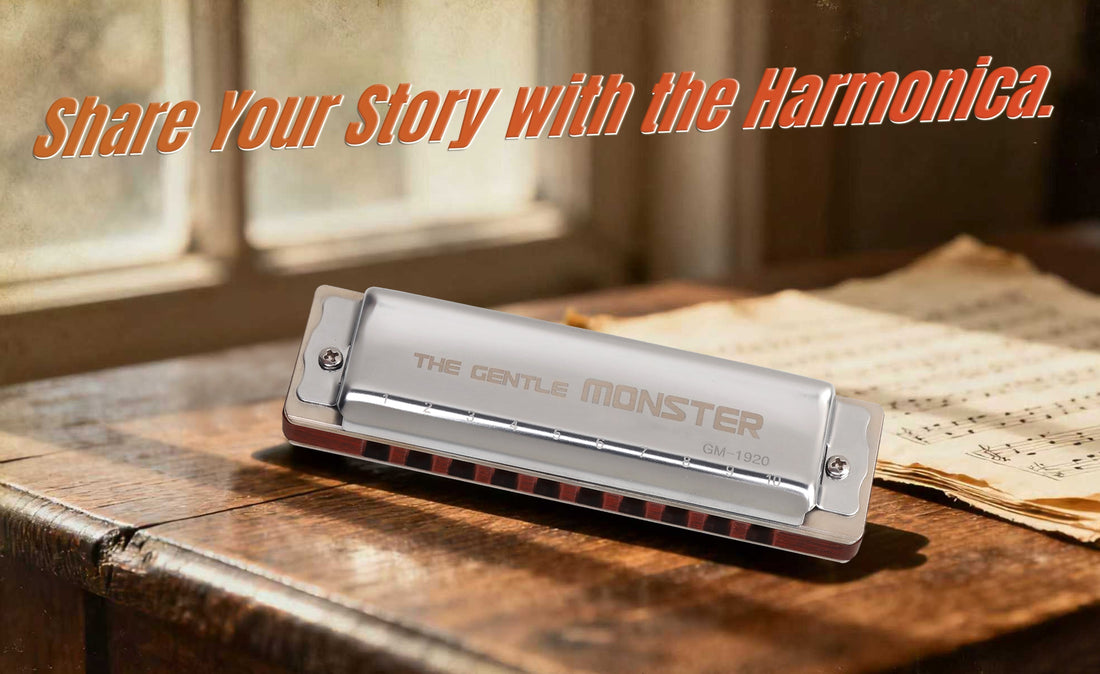
The harmonica tells the stories of time in the purest language.
Aktie
The harmonica, though seemingly ordinary, holds boundless emotions and stories. With its small size and unique timbre, it has become a warm symbol in many people's memories. The moment your lips touch the harmonica's grid and the airflow sets the reeds in motion to produce sound, time seems to slow down — that sound is pure and unadorned, like the yellowed edges of old photos, the blurred handwriting in old letters.
Next, let's listen to the time embedded in the melodies through a few pieces of music !🎵
《Londonderry Air》
👉Click the image to enjoy the music. (For sharing only)
《Londonderry Air》is an Irish folk song originating from Londonderry in Northern Ireland, and it shares the same melody as "Danny Boy".🎶
A century ago, an Irish father originally wrote it for his son who was about to join the military. In the song, he told his son: "When you come back next time, I will probably already be lying in my grave. It will be just like the end of a whole summer and the withering of flowers—just as I cannot keep you from leaving now."
《Auld Lang Syne》
👉Click the image to enjoy the music. (For sharing only)
The history of 《Auld Lang Syne》 dates back to the 18th century, and it was created by the Scottish poet Robert Burns. Burns included this song in his poetry collection and mentioned the song’s traditional origins in the notes to his poems. Originally, this song was sung by Scottish farmers during year-end harvest celebrations to express gratitude for the harvest of the past year and convey good wishes for the new year.🌟
As time passed, Auld Lang Syne gradually became a widespread tradition. People around the world now sing it on New Year’s Eve to celebrate the arrival of the new year, expressing nostalgia for the past and hope for the future. In many countries, whether at public events or family gatherings, people sing this song when the New Year’s bells ring, marking the transition from the old year to the new.
《Through the Raindrops》
👉Click the image to enjoy the music. (For sharing only)
Robert Bonfiglio was born in Iowa, the United States. During his teenage years, he pursued advanced studies at the New York School of Music. He initially learned to play the flute, but by the age of 17, he felt he had made little progress and had limited room for development in this instrument. Coincidentally, he was captivated by the touching timbre of the harmonica at that time, so he switched to learning the harmonica and was known as the "king of classical harmonica".
When listening to《Through the Raindrops》, one can feel that the composer conveys his feelings in a voice almost like murmurs in a dream. While creating an almost breathless atmosphere, he accurately expresses the delicate and boundless love deep in his heart.
《Love Story》
👉Click the image to enjoy the music. (For sharing only)
《Love Story》(also known as "Where Do I Begin") is the theme song of the 1970s American film Love Story (directed by Arthur Hiller). Performed by Andy Williams, the song perfectly interprets the loyalty and eternity of love portrayed in the film. This song won the Academy Award for Best Original Song that year.
Every piece of music is a unique imprint of time, and the harmonica, with its pure sound, carves these imprints into our memories. It does not pursue complicated techniques nor rely on fancy packaging; it only uses its authentic melodies to connect the past and the present, allowing us to feel the warmth of the years and the weight of emotions. Precisely because of this purity, the harmonica can transcend eras and become a timeless symbol in the hearts of people from different generations.
Everyone may have their own exclusive story with the harmonica: it could be the first tune taught by one's father in childhood, the melody secretly practiced in youth, or a familiar sound accidentally heard on a certain afternoon. If you also have such memories, feel free to share them in the comment section, so that these stories related to the harmonica can be heard and seen by more people.




